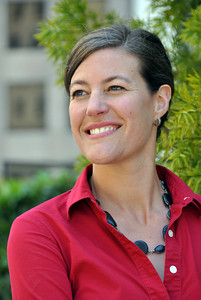 We encourage you to visit Rebecca Tarbotton’s memorial page to celebrate her life and share memories with the RAN community. If you would like to learn about Rainforest Action Network’s current leadership, please click here.
We encourage you to visit Rebecca Tarbotton’s memorial page to celebrate her life and share memories with the RAN community. If you would like to learn about Rainforest Action Network’s current leadership, please click here.
Rebecca Tarbotton, a longtime environmental, human rights and food activist, and a self-described pragmatic idealist. “For me the biggest challenge about the work we do is that the symptoms of environmental damage are so obvious, it’s hard to stay focused on the root causes,” she says. “That’s one of the things that makes RAN unique. We provide pathways to connect people directly to the root causes of ecological collapse, by tackling the most pressing symptoms using strategies that demand transformative change.”
And she should know. For over three years before becoming executive director, Tarbotton led campaigns at RAN against one of the most invisible, yet potent forces behind environmental destruction: financing of fossil fuel projects by large American banks. As Global Finance Campaign Director, Tarbotton went toe to toe with some of the nation’s most powerful CEOs to lead RAN to one of its most important victories of the past decade: the creation of a sector-wide bank policy statement known as the Carbon Principles. The policy put limits on the financing of new coal-fired power plants, creating a pivotal moment in the battle to curtail the construction of 200 planned new coal plants.
“That’s really why I wanted to work at RAN,” she remembers. “It’s one of the few organizations out there that’s working on transforming our economy by changing the way that corporations do business. A fundamental shift is necessary to create a future where humans are in balance with nature.”
In a career spent largely overseas, Tarbotton has seen the reach of corporate policies firsthand. Although she started as an environmental researcher among Indigenous communities on Baffin Island in her native Canada, Tarbotton spent eight years in Ladakh, Northern India, working with local communities to support their traditional food and farming systems that have supported them for generations. One of her proudest achievements is helping build a local women farmer’s alliance from a membership of seven women to a whopping 4,000 members.
“Working with those women, helping them build alternatives to the western development model that was being imposed on their communities, was a foundational experience for me. It showed me that local wisdom is a powerful tool for change and that true solutions, when grounded in deep respect for cultural traditions, ecological wisdom and creativity can both improve quality of life and build a future where people live in harmony with nature.”
“Corporations don’t see any of that. They are structurally disembodied from local realities and are beholden to the bottom line. It’s local communities and ecosystems that bear the brunt of this model of doing business, and their destruction rarely shows up on the balance sheet.”
A commitment to community-led solutions drew Tarbotton to the UK, where she worked in the local food movement. “As recently as the late nineties, the idea of ‘local food’ was still considered a bit wacky” says Tarbotton. “Organic was gaining popularity, but the local food movement was just getting off the ground. We spent a lot of time convincing all sorts of people that shrinking the distance between farmer and consumer was one of the most important ways to build a sustainable food system, but corporate interests kept getting in the way.” Seeking a more direct way of challenging corporate power, Tarbotton moved to California where she joined the growing movement against genetically modified food. She took on the role of campaign coordinator for a state-wide coalition of farmer, consumer and advocacy groups working to stop the spread of genetically modified seeds in California, county by county.
“We were winning county-level GMO seed bans and moratoriums when we realized that Big Ag was striking back, slipping seed preemption bills into state legislatures without anyone realizing it,” she recalls. “These bills essentially prevented any community from making decisions about what was planted within their boundaries. We knew that California was bound to be on the list and so we mounted a campaign to stopped Big Ag from doing the same thing here. After a long battle, we won.”
As the first woman ever to lead Rainforest Action Network, Tarbotton represents the perfect bridge between the organizations past and its future. One of the few organizations to work on the intersections between forests, fossil fuels and climate change, RAN believes firmly that local, community driven solutions are the only way to save the planet. Like Tarbotton, the organization looks for the solutions that spring from an unwavering belief in the possible combined with a practical approach that makes their campaigns relevant and timely. Says Tarbotton, “the best thing about RAN is that we stay true to our ideas, while being unwavering in our commitment to strategies that actually win.”
Tarbotton earned a bachelor’s degree from University of McGill and a Master’s Degree from the University of British Columbia.